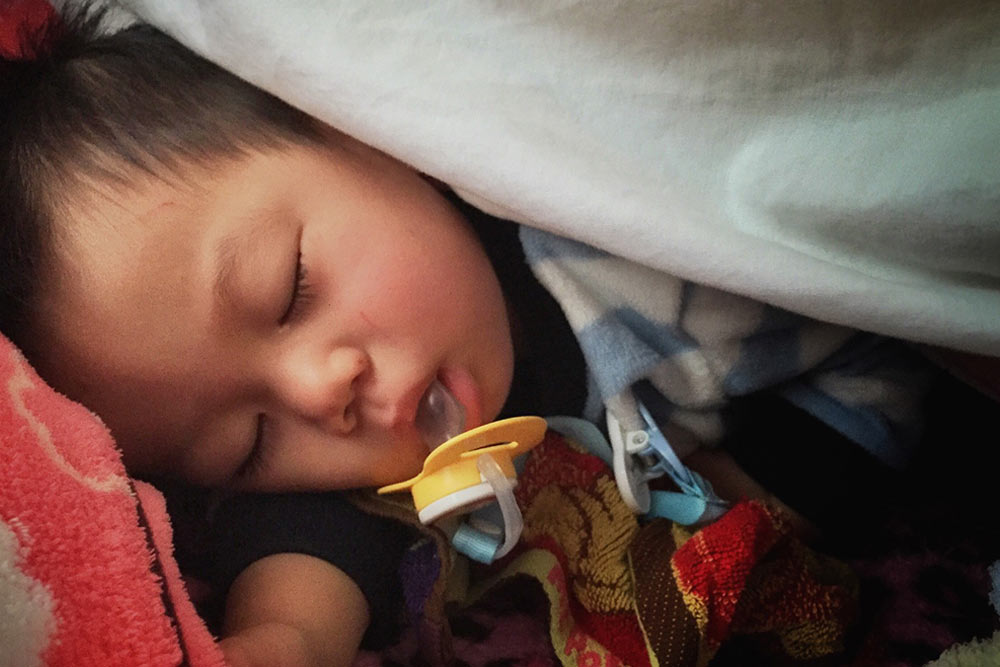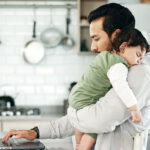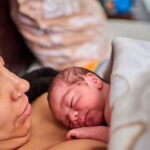Tips for Fighting Baby’s Cold

With any luck, your wee one won’t have to battle more than a little sneezing and coughing.
We know those tiny sniffles are heartbreaking, but even the smallest of immune systems must be put to the test at some point. While baby’s first year may be less than ideal timing, the American Academy of Pediatrics (AAP) says it’s common for children to get eight to 10 colds before age 2. The good news is the majority of cases come and go without big problems and with non-severe side effects. Read on for guidance in getting through baby’s first cold—and how to keep the next one at bay.
Diagnose a Common Cold
The cold virus is essentially a viral respiratory tract infection, characterized by nasal congestion and a runny nose with clear mucus that thickens and turns yellow, green or grey; a mild cough; or unusual tiredness or irritability.
Cold symptoms generally last for 72 hours or so, and then begin to improve over the next five to seven days. If cold symptoms linger for more than 10 days, or continue to get worse after three days, you should call your pediatrician for medical advice.
It’s possible for what begins as a cold to turn into a more serious illness. (This is especially true for high-risk babies, such as preemies, young infants and babies with heart or lung conditions.) Particularly in children under the age of 2, a common cold can sometimes lead to Respiratory Syncytial Virus (RSV). Typical symptoms of RSV are:
RSV is not always a serious infection, but it can be—so it warrants supervision from a healthcare provider. Without proper attention, it can easily develop into pneumonia or bronchitis. For more facts on RSV visit www.rsvprotection.com.
Maximize Recovery
Since colds and RSV are both viruses, an antibiotic won’t help; for the most part, you just have to let them run their course. But the lack of a magic cure doesn’t mean you’re entirely helpless. There are a few things you can do to help your baby feel better and heal faster:
Allow your baby to get plenty of rest. Encouraging extra naps with plenty of rocking, soothing songs and quiet time will prevent your little from being too exhausted and cranky to get comfortable.
Make sure your child is consuming enough liquids to flush the viruses out of her system. Offer your breast more often if breastfeeding and allow plenty of time for feedings. (Do not give your baby water if they are under age 1, unless otherwise instructed by your child’s doctor.) Upped liquid intake can be tricky, since congested, fussy babies and young children aren’t always interested in drinking. (With their nose and mouth plugged, difficulty breathing is common. This is especially true for newborn babies, as they only have the ability to breathe through their noses for the first few months of life.) Try squirting a few drops of baby safe saline nose drops into each of your child’s nostrils, and then use a bulb syringe to suction out the liquid. Doing so will help open the nasal passages (at least temporarily), making breathing while eating more feasible.
Use a cool-mist humidifier or vaporizer to relieve congestion in baby’s nose. (You can also run a hot shower to create a steamy bathroom for a similar effect.) Adding eucalyptus or tea tree oil to the humidifier can help, too.
Note: You’ve probably seen the slew of cough and cold medications available over-the-counter at your local store, but you should always consult a pediatrician before giving your baby any cold medicines.
Avoid Future Sickness
A little effort can go a long way! While you surely can’t prevent your child from ever getting sick, you can do your best to make sure it happens as infrequently as possible. Here’s what you can do to keep stuffy noses away:
Wash your hands, as well as your baby’s. (Or use an alcohol-based hand sanitizer if necessary on your hands only, though these rubs are not as effective as good old soap and hot water.) A solid scrub of the fronts and backs of your hands, wrists, fingers and fingernails will wash away any potential achoo!-inducing germs. And since your baby’s pudgy little fingers often find their way into her mouth, be sure to wash them regularly, too.
Keep your baby away from any older siblings who have a cold or RSV until they are no longer contagious, usually three to seven days. Sharing toys is laudable; sharing viruses, not so much.
If possible, steer clear of childcare centers during cold season. Because the number of children at these facilities is great, so too is the number of germs to which little ones will be exposed.
Ensure that your baby stays hydrated. Consuming plenty of liquid will help keep the nasal cavities slimy and sticky (a pretty picture, huh?), so that they can catch and detain any unwanted germs before they infect your sweet pea.







